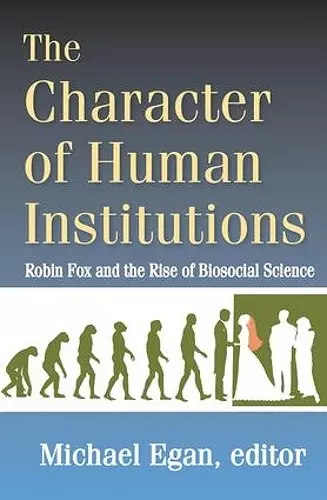The Character of Human Institutions
Robin Fox and the Rise of Biosocial Science
Michael Egan author Michael Egan editor
Format:Hardback
Publisher:Taylor & Francis Inc
Published:30th Jun '14
Currently unavailable, and unfortunately no date known when it will be back
This hardback is available in another edition too:
- Paperback£39.99(9781412865548)

This volume celebrates the life and work of Robin Fox and the idea of a biosocial science. From his early studies of kinship, primates, the brain, evolution, the incest taboo, and aggression, to his later work on literature, politics, civilization, law, the Bible, Shakespeare, and the history of ideas, Robin Fox inspired many with an evolutionary vision of humanity that goes beyond narrow disciplinary boundaries and embraces the "universal history of mankind." Fox's work represents an independent "biosocial science" stream of thinking that accepts the Darwinian mandate while avoiding reductionism by recognizing culture as a natural phenomenon.
The essays cover Fox's life and his contributions, and address topics as diverse as the meaning and function of laughter; the unforgiving discipline of writing popular anthropology; extreme drinking rituals among young men training for the British army; Darwin and close-cousin marriage; the universal essence of the epic form as a super-attractor; anthropologists' autobiographies; the conflict between science and anti-science; and the decline of British imperial education.
This engaging collection on a "mainstream maverick" has been edited by Michael Egan. It includes essays by Sir Antony Jay, Lionel Tiger, Howard Bloom, Michael McGuire, Kate Fox, Melvin Konner, Alan Macfarlane, Adam Kuper, Dieter Steklis, Alexandra Maryanski, Bernard Chapais, Jonathan Turner, Linda Stone, Charles Macdonald, Anne Fox, David Jenkins, Frederick Turner, Robert Trivers, and an essay by Robin Fox himself.
“This festschrift, of sorts, for Robin Fox, a major figure in biosocial science and modern anthropology, contains essays by major thinkers in the field, and covers a wide variety of subjects: a fitting tribute to a polymath scientist whose interests and contributions range widely as well. . . . This is a wonderful, sparkling collection of writing on ideas, their history and their importance to society.”
—ProtoView
“This work of seventeen outstanding essays is a fitting tribute to Robin Fox, one of the most eminent anthropologists and polymaths of our time, now in his eightieth year. Fox is a courageous warrior who declared war on mainstream social science almost 50 years ago. He renounced its cultural relativism and ideologically-driven social constructionism that claimed to explain everything, and hence nothing, in his 1971 book (with Lionel Tiger) The Imperial Animal. His clarion call in this and numerous other works calling for investigations into pancultural human nature set me a countless others on the quest for biosocial theory in the social sciences. As this book, and a cascade of other books and articles can attest, he has lived to see his dream come true. Biosocial science has breached the shoddy walls of twentieth century social science and is about to take the castle keep.”
—Anthony Walsh, Boise State University
“Robin Fox’s pioneering work on the significance of primate studies for socio-cultural anthropology in the 1970s was deeply inspirational to me. That so many of Robin’s ideas were to be vindicated by subsequent research testifies to the visionary character of his thinking at a time when the primate data base was rather scanty, and attempts to bridge the biological and socio-cultural realms were generally met with skepticism or indifference, at best.”
—Bernard Chapais, University of Montreal
“Sadly Robin may be one of the last great social anthropologists of our lifetime . . . And it may be a very long time indeed before we have someone like Robin who masters all of anthropology, from kinship right on up. This excellent book gives us a taste of such an organism and why it so valuable to have at least one of them around.”
—Robert Trivers, Crafoord Prize for Theoretical Biology of the Swedish Royal Academy
ISBN: 9781412853774
Dimensions: unknown
Weight: 800g
396 pages